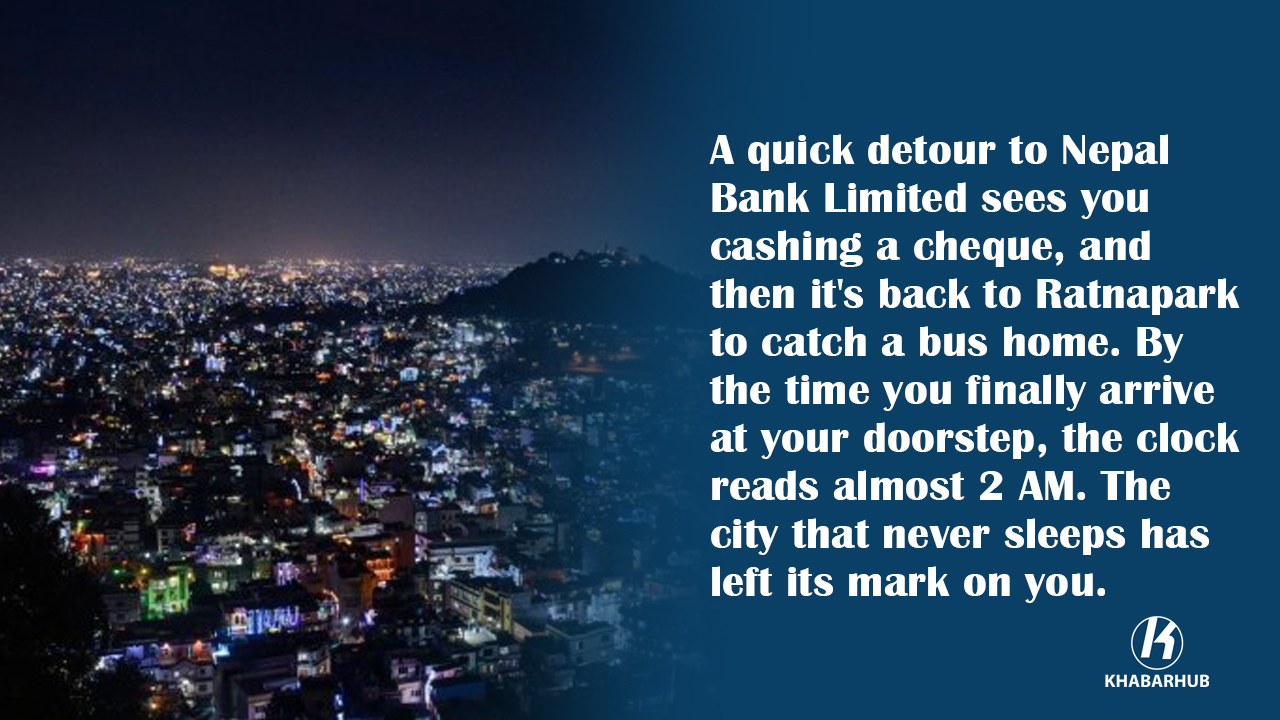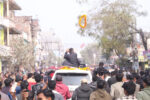KATHMANDU: Picture this: The clock strikes 10 PM, and you find yourself on the rooftop of a restaurant near the iconic Boudhanath, having just concluded a meeting with a client.
The vibrant atmosphere is palpable – people circumambulating the stupa, tourists exploring shops and galleries, and the air rich with the aroma of freshly brewed coffee and the soothing fragrance of Tibetan incense.
As you step onto the bustling main road, the omnipresent watchful eyes of CCTVs keep a constant vigil. Opting for a public bus, you make your way to New Road.
The lively energy of the city continues to captivate you as you explore mobile stores and immerse yourself in the lively ambiance of Basantapur Durbar Square, where coffee and tea shops are abuzz with enthusiasts.
A quick detour to Nepal Bank Limited sees you cashing a cheque, and then it’s back to Ratnapark to catch a bus home. By the time you finally arrive at your doorstep, the clock reads almost 2 AM. The city that never sleeps has left its mark on you.
In this alternate reality, Kathmandu thrives as a 24/7 metropolis, offering a dynamic lifestyle where work, leisure, and socializing seamlessly blend into the night. Imagine working at night, attending gatherings during the day, and a city that pulsates with life around the clock.
Kathmandu as a 24/7 metropolis holds immense potential, not only for economic growth but also for improving the quality of life for its residents. It’s a vision that sparks excitement, offering a dynamic and thriving city where the night becomes an integral part of the urban experience.
A 24/7 economy fuels businesses and restaurants, creating a high demand for employees in a city that never rests. The possibility of such a vibrant and bustling Kathmandu is both enticing and invigorating, where the night holds as many opportunities as the day.
But the advantages extend beyond mere opportunities. This could be a strategic solution to the persistent issue of traffic congestion.
Without specific ‘office hours,’ the city experiences distributed peak hours, making commuting more manageable.
Imagine a Kathmandu where businesses operating at various times allow employees to choose flexible working hours, leading to staggered commuting patterns and a decrease in congestion during traditional peak hours.
Moreover, the 24/7 operation of essential services would enhance accessibility for residents. Emergency services, healthcare facilities, and public amenities would be available round the clock, ensuring that the city caters to its inhabitants’ needs at any time.
Consider living on the outskirts of Kathmandu. One night, a loved one falls seriously ill, necessitating an urgent trip to the hospital. Your immediate instinct is to secure a cab in Kathmandu. However, reality hits – you’d have no choice but to rush to the nearest chowk or main road, hoping to find a cab in Kathmandu’s often restricted night transport network. If luck is on your side, you might secure a cab, but in a city where nighttime transportation is predominantly limited to central areas, the struggle is real.
Picture this: You may find yourself making urgent calls to friends or neighbors or, in some instances, physically carrying your unwell companion to the nearest accessible road, all in the hope of flagging down a cab. Even after securing transportation, the challenge doesn’t end there. Kathmandu, like many cities, boasts only a handful of hospitals operating 24/7, often with a limited workforce. Nighttime medical attention becomes a scarce commodity, with doctors and specialists scarcely available.
However, in an alternate scenario, one can’t help but imagine a different narrative – a Kathmandu transformed into a 24-hour city.
In this envisioned cityscape, accessible transportation is not confined to specific areas, and hospitals are equipped to provide round-the-clock medical care. Such a shift could potentially rewrite the story of that anxious night, offering a smoother, more accessible journey for those in need of urgent medical attention.
In a global context, cities like Cairo, Montevideo, and Beirut have embraced the 24-hour lifestyle. London, Paris, and New York follow suit, emphasizing the potential success of such a transformative shift for Kathmandu.
Of course, challenges and downsides exist. Concerns about the impact on workers’ health and the need for careful management of entertainment extensions should be addressed. Yet, this shift could generate new job opportunities, particularly in the realm of security.
Kathmandu as a 24/7 metropolis holds immense potential, not only for economic growth but also for improving the quality of life for its residents. It’s a vision that sparks excitement, offering a dynamic and thriving city where the night becomes an integral part of the urban experience.









Comment